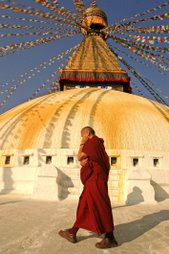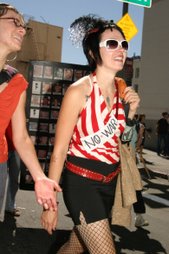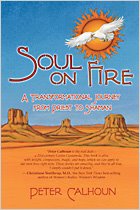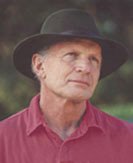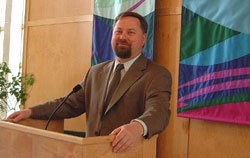What's wealth, power, and fame without peace of mind?
Ananse was in his mid-thirties. He had a wife and two children. He had worked his father’s farm. No matter how hard he worked, he remained in debt. He decided to end his financial troubles. He traveled to a far away village to consult a medicine man.
The medicine man asked Ananse for the name of a dear family member. Ananse gave him his wife’s name. The medicine man performed a ritual and told Ananse that when he returned home, money would be in his closet. He also told him that he should not weep for anyone who died when he was away.
When Ananse got home he discovered his wife was dead. His wife’s sudden death shocked and saddened him but he obeyed the medicine man. He did not weep for his wife. He discovered that his wife died on the same day and at the same time that the medicine man asked him for her name.
Ananse opened his closet. He found boxes of hundred dollar bills. Ananse became wealthy overnight. Ananse built many houses. He remarried. He became a respectable member in the society. But Ananse was not happy. Every night, as he closed his eyes to sleep, he would see his wife, weeping, pleading to be set free.
Ananse could not drive his wife’s spirit away. Gradually, the wise men and women in the village found out what Ananse had done. They did not banish him. They allowed him to stay in the town but no one had any dealings with him. Although Ananse had all the money he wanted, he lost his relationship with his family and the community. He did not have peace of mind.
Many of us are like Ananse making the choice unknowingly between what the world promises us and our peace of mind. If you knew you could be the richest person in the world and lose your friends and family and your peace of mind, what would you do? And if you knew you could be the most famous person and most powerful individual but would lose your family and friends and your sanity what would you do?
Peace springs within us in a well that does not dry. Access to that peace is independent of what happens to us from the outside world. Our spiritual Elders have told us about a priceless diamond within us that we must all mine. They have reminded us over and over again that we should desire this peace within us above everything else. For some this peace within is synonymous to the presence of God and to the Kingdom of God.
I leave you with the words of Joel S. Goldsmith as he describes the process of obtaining this inner peace. As you meditate on these words, you may substitute God with the word peace. See what happens when you spend some time in this frame of mind. Shalom!
“If I desire God with all my heart and with all my soul and with all my mind, do I have room left to desire anything else and is there anything for me to desire after I have given my whole desire to God? I desire only God - to know You rightly - to live consciously in Your presence. This is my desire and all other desires I surrender to You. No longer do I have any desire but to know You rightly. Ambition? What ambition is there? What is there that I could be ambitious for after I have known God? Is there something in the world of greater value than God? Is there something of greater benefit than God? No. No. Knowing God, having God, I can have no further ambition, and I can surrender my ambition unto You. Hope, desire, ambition, fear. All these I surrender. And now, there is nothing left in the external world for me to be attached to.”
For a complete text of this meditation visit: http://www.beyondprayerandmeditation.com/bd010a2.htm
Showing posts with label God. Show all posts
Showing posts with label God. Show all posts
Saturday, July 14, 2007
Saturday, July 7, 2007
The Fearless Life

The night before her annual mammogram in the summer of 2003, Jan Frazier said a prayer. "Could I maybe do this [mammogram] tomorrow without being terrified?"
Jan, who turned fifty that summer and had endured three breast cancer scares in her early thirties and forties, was afraid of an early death.
This is understandable. In 2003, the U.S. Cancer Statistics Working Group reported that one out of every four women diagnosed with breast cancer dies.
Jan, who turned fifty that summer and had endured three breast cancer scares in her early thirties and forties, was afraid of an early death.
This is understandable. In 2003, the U.S. Cancer Statistics Working Group reported that one out of every four women diagnosed with breast cancer dies.
"The specter of a possible young death put fear in my face, the ugly thieving monster of it," Jan writes in her soulful story of spontaneous awakening: When Fear Falls Away.
The following morning when this mother of two teenagers went to see her radiologist at a Jamaica Plain hospital, in Massachusetts, she noticed a change.
"I really was not afraid today. I couldn't get over it. After the films were taken and then the waiting began, I watched myself sit comfortably in the waiting room, reading my magazine, paying attention to what it said, instead of how it always was in the past, looking at the pages but not really seeing them."
When Fear Falls Away is a "testimony to a life transformed – an ordinary, fully suffering life transformed." It is about a middle class American woman’s victory over her worries about children, guilt, others' opinions, health, money, and fear of death.
There's so much suffering in our world. Even those who appear to have everything going for them are hurting deep within. The big cars, mansions on beaches, and the latest electronic gadgets do not in themselves satisfy our deep yearning for inner peace. When Fear Falls Away tells of the ocean of joy that is possible for all of us when we turn within to the inner consciousness. Material joy is like a drop in that vast expanse of deep peace.
Theravada Buddhism teaches that "enlightenment consists of the complete eradication of craving and attachment." In Zen Buddhism, it comes through emptying of the mind. In Western Christian literature, enlightenment is union with God. In Orthodox Christianity, it is divinization, or the process of becoming God.
Many doors lead to enlightenment's interior castle and include various forms of spiritual practice: meditation, devotion, and prayer. Mathematical or philosophical abstraction and being in the presence of enlightened individuals are other doorways. Enlightenment can also happen spontaneously.
These experiences are ineffable, difficult to express in prosaic terms. In Western Culture the enlightened individual can be misdiagnosed as mad if the individual experiencing this breakthrough in consciousness is not sophisticated enough to check himself or herself. At a diner while she was having breakfast with Peter, her significant other, we see Jan struggling to control her overwhelming urge to go out to tell everyone eating: "Do you know how lucky you are to be alive?"
Enlightenment is the most sublime change any individual can experience.
"The world has not changed. It is the looker who has changed. But I keep having to hit myself upside the head to believe the world is its same self. I cannot believe it. It's like I want to say, What? It's been this way all along? You mean, I could have lived my whole life this way, spared myself all that pointless anguish?"
I have borrowed a copy of When Fear Falls Away from the local library for my significant other who is reading it. I have bought two copies: There are some books you skim and forget. There are some books you read to remember. And there are some books you study and keep. For me, Jan Frazier’s book is a book I will read and reread, marking it, making notes, getting clues and tracking down all the influences that have prepared Jan for this most wonderful of human experiences.
Here is a like to Jan Frazier's website
Subscribe to:
Posts (Atom)

